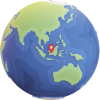Case studies are organised by region, with each region featuring links to the countries where the case studies are located.
Papua New Guinea

A report by Global Witness has revealed the extent of the human rights abuses linked to the palm oil industry in Papua New Guinea (PNG). A range of severe violations against local communities and workers are exposed in the report, implicating three major PNG oil producers, East New Britain Resources Group (ENB), Rimbunan Hijau Group (RH), and Bewani Oil Palm Plantations Ltd (Bewani). These companies are accused of using violence and coercion to eliminate any opposition to the extension of their production. Villagers resisting land acquisition and plantation activities are coerced into compliance through threats and physical violence. As a result, large-scale land grabs for palm oil plantations have resulted in the displacement of hundreds of families in PNG.
Exploiting corrupt individuals within the national police force the Royal Papua New Guinea Constabulary, the companies intimidate villagers. Reported incidents include late-night raids where individuals were beaten and detained at gunpoint. In addition, the companies’ employees often face exploitative practices. ENB has, for example, been reported to use child labour on their plantations, with children as young as ten reportedly working in hazardous conditions. Workers also often lack proper safety equipment, and safety and health incidents are often unreported or inadequately addressed. Moreover, there are concerns over corrupt business practices across these companies, with ENB executives having admitted to bribing government officials to secure logging permits and land access.
Keywords: South East Asia & Pacific, Papua New Guinea, palm oil, primary production, human rights violations, land grabbing, corruption and bribery, child labour, labour rights violations
Sources: https://www.business-humanrights.org/en/latest-news/investigation-exposes-how-global-financial-institutions-household-brands-are-linked-to-palm-oil-deforestation-human-rights-abuse-in-papua-new-guinea-incl-cos-comments/
https://www.globalwitness.org/en/campaigns/forests/true-price-palm-oil/

The biggest fraud investigation in Papua New Guinea (PNG) led to the uncovering of the misappropriation of approximately US$75 million from a trust fund linked to the Ok Tedi mine, a controversial mine accused of causing severe environmental damage to its surrounding community over the last few decades. The mine led to one of the worst environmental disasters, with around two billion tons of untreated mining waste being discharged from the mine. The fraud investigation discovered a money laundering and misappropriation scheme, finding that funds intended to go to the PNG’s Western Province were instead improperly paid to the OK Tedi Fly River Development Foundation and their Australian law firm. A prominent Australian lawyer was arrested on multiple charges relating to the misappropriation of the funds.
Keywords: South East Asia & Pacific, Papua New Guinea, minerals, primary production, money laundering
Source: https://globalinitiative.net/wp-content/uploads/2024/03/Virginia-Comolli-An-industry-of-crime-Foreign-businesses-and-illicit-practices-in-the-Pacific-GI-TOC-April-2024.pdf

Sources increasingly suggest that logging concessions are used by corrupt politicians as a tool for building personal wealth. The Governor of the country’s Oro province has been a vocal critic of the logging cartels operating in the region over the past decade, describing all such logging ventures as unlawful, as they don’t have informed consent of landowners (and, indeed, a report by Chatham House has deemed at least 70% of logging in the country illegal). While loggers may seek specific tree species with high timber value (for example, Papua New Guinea rosewood (Pterocarpus indicus)), much of this logging activity nevertheless involves the indiscriminate felling of trees, which are subsequently taken to log yards and sorted through, with the high value timber selected at this stage. According to a 2017 National Risk Assessment by the Bank of Papua New Guinea, illegal logging in the country poses a significant threat to money laundering. The assessment stated that there are strong indicators of large-scale corruption and illegal logging in the forestry sector in the country which result in high levels of proceeds of crime. It is widely accepted that the problem is widespread and that the lost revenue is extensive. A 2021 report noted that according to online company filings in Papua New Guinea, the country’s commercial banks have provided at least K300 million (USD 79 million) in available credit to the top five log exporting companies since 2000. However, nearly two-thirds of the registered financing transactions are for an unspecified amount, and the top five exporters only account for 52% of total log exports. As such, the total credit made available to the entire logging industry could reasonably be more than three times this amount.
Keywords: South East Asia & Pacific, Papua New Guinea, timber, primary production, procurement of permits, illegal deforestation, corruption and bribery
Sources: https://news.mongabay.com/2023/11/logging-road-construction-continue-to-fuel-forest-loss-in-papua-new-guinea/
https://news.mongabay.com/2021/12/governor-rails-against-bioterrorists-carbon-cowboys-destroying-pngs-forests/
https://www.looppng.com/png-news/court-halts-logging-musa-101877
https://forestgovernance.chathamhouse.org/


A Global Witness investigation has revealed that a rubber plantation on Manus Island, Papua New Guinea (PNG), controlled by Malaysian-owned Maxland Limited, is likely a front for illegal logging. As a result, the logging operations carried out by this company have had devastating effects on the island's biodiversity. Maxland's permits for timber exploitation on the island are allegedly unlawfully obtained, breaching numerous PNG Forestry Act sections. This has created allegations of bribery surrounding Maxland’s rubber project. In addition, Maxland had promised Indigenous locals economic benefits from the plantation, such as new infrastructure, poverty alleviation, and employment, which failed to materialise. Evidence suggests that the company instead has exploited the valuable local tropical hardwoods, regardless of the environmental destruction this may cause. The project has sparked conflicts amongst the local community due to its subsequent environmental degradation and its creation of social issues, which have disproportionately impacted women and led to violence and protest.
Keywords: South East Asia & Pacific, Papua New Guinea, rubber, timber, primary production, illegal logging, environmental crime, corruption and bribery
Sources: https://www.globalwitness.org/en/campaigns/forests/bending-the-truth/

An undercover investigation by Global Witness exposed bribery for palm oil in Papua New Guinea. The investigation involved secretly filming a palm oil executive who admitted to paying bribes to public officials in exchange for logging permits and access to land. The executive was from East New Britain Resources Group (ENB), one of the largest logging and palm oil firms operating in Papua New Guinea. The bribes to a government minister typically ranged from 50,000 to 100,000 Papua New Guinean kina ($14,000-28,000). The CEO of ENB was also filmed describing a tax evasion scheme. Another palm oil firm, Tobar Investment, was caught discussing payments to a special police unit to suppress villagers opposed to their plantations. The palm oil from ENB has been used by major consumer goods companies, which severed ties with ENB after the investigation. This case highlights the role of political corruption in deforestation and the exploitation of Papua New Guinea’s rich biodiversity.
Keywords: South East Asia & Pacific, Papua New Guinea, palm oil, timber, primary production, corruption and bribery
Source: https://news.mongabay.com/2021/10/hidden-camera-footage-exposes-bribery-for-palm-oil-in-papua-new-guinea/


The Environmental Crimes Financial Toolkit is developed by WWF and Themis, with support from the Climate Solutions Partnership (CSP). The CSP is a philanthropic collaboration between HSBC, WRI and WWF, with a global network of local partners, aiming at scaling up innovative nature-based solutions, and supporting the transition of the energy sector to renewables in Asia, by combining our resources, knowledge, and insight.


